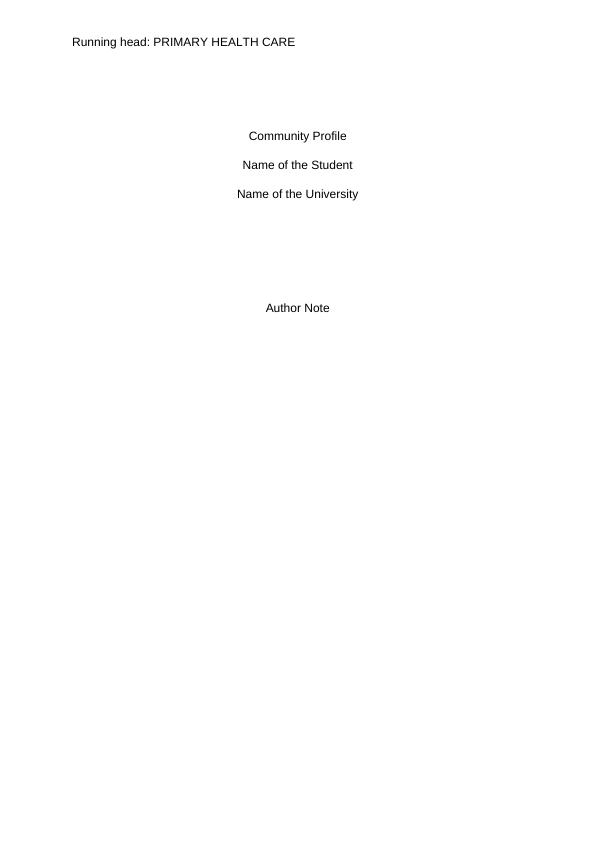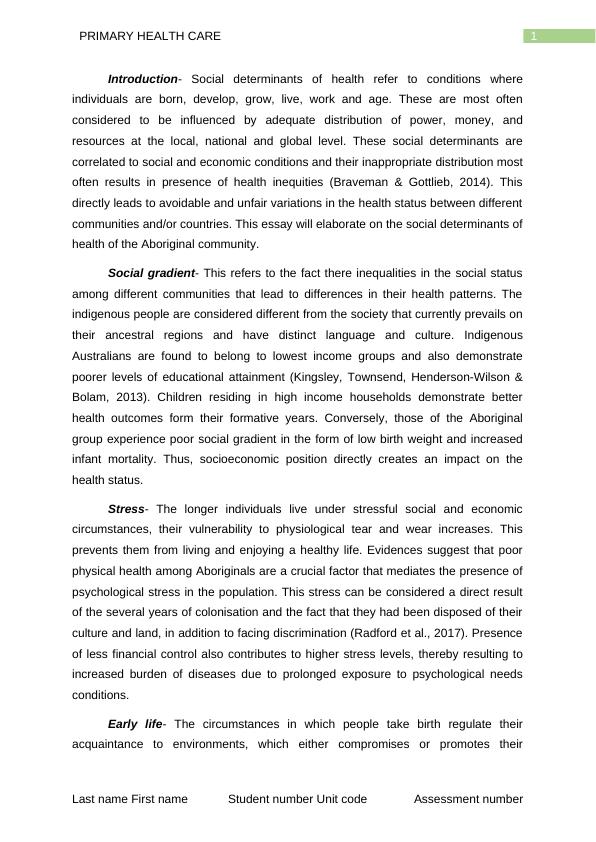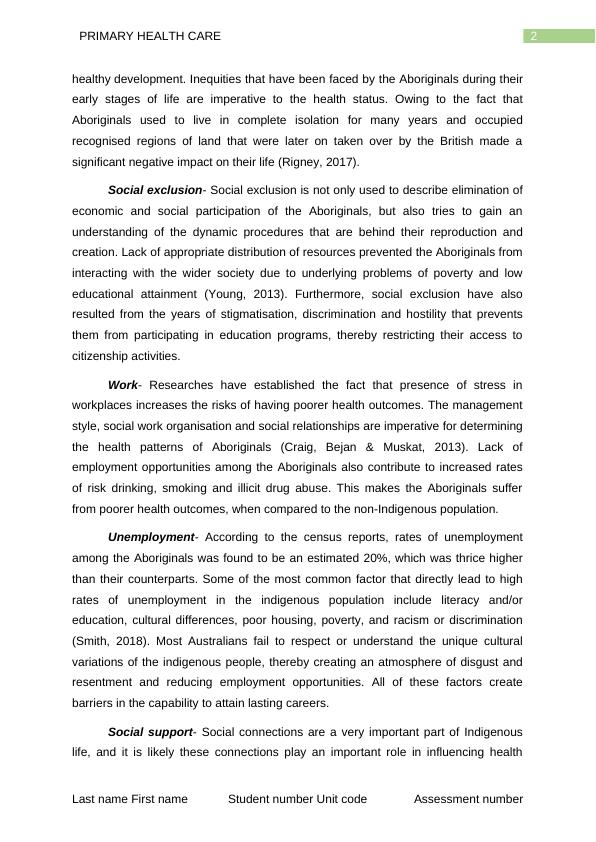Social Determinants of Health of the Aboriginal Community
Added on 2023-06-09
6 Pages1882 Words157 Views
Running head: PRIMARY HEALTH CARE
Community Profile
Name of the Student
Name of the University
Author Note
Community Profile
Name of the Student
Name of the University
Author Note

1PRIMARY HEALTH CARE
Introduction- Social determinants of health refer to conditions where
individuals are born, develop, grow, live, work and age. These are most often
considered to be influenced by adequate distribution of power, money, and
resources at the local, national and global level. These social determinants are
correlated to social and economic conditions and their inappropriate distribution most
often results in presence of health inequities (Braveman & Gottlieb, 2014). This
directly leads to avoidable and unfair variations in the health status between different
communities and/or countries. This essay will elaborate on the social determinants of
health of the Aboriginal community.
Social gradient- This refers to the fact there inequalities in the social status
among different communities that lead to differences in their health patterns. The
indigenous people are considered different from the society that currently prevails on
their ancestral regions and have distinct language and culture. Indigenous
Australians are found to belong to lowest income groups and also demonstrate
poorer levels of educational attainment (Kingsley, Townsend, Henderson-Wilson &
Bolam, 2013). Children residing in high income households demonstrate better
health outcomes form their formative years. Conversely, those of the Aboriginal
group experience poor social gradient in the form of low birth weight and increased
infant mortality. Thus, socioeconomic position directly creates an impact on the
health status.
Stress- The longer individuals live under stressful social and economic
circumstances, their vulnerability to physiological tear and wear increases. This
prevents them from living and enjoying a healthy life. Evidences suggest that poor
physical health among Aboriginals are a crucial factor that mediates the presence of
psychological stress in the population. This stress can be considered a direct result
of the several years of colonisation and the fact that they had been disposed of their
culture and land, in addition to facing discrimination (Radford et al., 2017). Presence
of less financial control also contributes to higher stress levels, thereby resulting to
increased burden of diseases due to prolonged exposure to psychological needs
conditions.
Early life- The circumstances in which people take birth regulate their
acquaintance to environments, which either compromises or promotes their
Last name First name Student number Unit code Assessment number
Introduction- Social determinants of health refer to conditions where
individuals are born, develop, grow, live, work and age. These are most often
considered to be influenced by adequate distribution of power, money, and
resources at the local, national and global level. These social determinants are
correlated to social and economic conditions and their inappropriate distribution most
often results in presence of health inequities (Braveman & Gottlieb, 2014). This
directly leads to avoidable and unfair variations in the health status between different
communities and/or countries. This essay will elaborate on the social determinants of
health of the Aboriginal community.
Social gradient- This refers to the fact there inequalities in the social status
among different communities that lead to differences in their health patterns. The
indigenous people are considered different from the society that currently prevails on
their ancestral regions and have distinct language and culture. Indigenous
Australians are found to belong to lowest income groups and also demonstrate
poorer levels of educational attainment (Kingsley, Townsend, Henderson-Wilson &
Bolam, 2013). Children residing in high income households demonstrate better
health outcomes form their formative years. Conversely, those of the Aboriginal
group experience poor social gradient in the form of low birth weight and increased
infant mortality. Thus, socioeconomic position directly creates an impact on the
health status.
Stress- The longer individuals live under stressful social and economic
circumstances, their vulnerability to physiological tear and wear increases. This
prevents them from living and enjoying a healthy life. Evidences suggest that poor
physical health among Aboriginals are a crucial factor that mediates the presence of
psychological stress in the population. This stress can be considered a direct result
of the several years of colonisation and the fact that they had been disposed of their
culture and land, in addition to facing discrimination (Radford et al., 2017). Presence
of less financial control also contributes to higher stress levels, thereby resulting to
increased burden of diseases due to prolonged exposure to psychological needs
conditions.
Early life- The circumstances in which people take birth regulate their
acquaintance to environments, which either compromises or promotes their
Last name First name Student number Unit code Assessment number

2PRIMARY HEALTH CARE
healthy development. Inequities that have been faced by the Aboriginals during their
early stages of life are imperative to the health status. Owing to the fact that
Aboriginals used to live in complete isolation for many years and occupied
recognised regions of land that were later on taken over by the British made a
significant negative impact on their life (Rigney, 2017).
Social exclusion- Social exclusion is not only used to describe elimination of
economic and social participation of the Aboriginals, but also tries to gain an
understanding of the dynamic procedures that are behind their reproduction and
creation. Lack of appropriate distribution of resources prevented the Aboriginals from
interacting with the wider society due to underlying problems of poverty and low
educational attainment (Young, 2013). Furthermore, social exclusion have also
resulted from the years of stigmatisation, discrimination and hostility that prevents
them from participating in education programs, thereby restricting their access to
citizenship activities.
Work- Researches have established the fact that presence of stress in
workplaces increases the risks of having poorer health outcomes. The management
style, social work organisation and social relationships are imperative for determining
the health patterns of Aboriginals (Craig, Bejan & Muskat, 2013). Lack of
employment opportunities among the Aboriginals also contribute to increased rates
of risk drinking, smoking and illicit drug abuse. This makes the Aboriginals suffer
from poorer health outcomes, when compared to the non-Indigenous population.
Unemployment- According to the census reports, rates of unemployment
among the Aboriginals was found to be an estimated 20%, which was thrice higher
than their counterparts. Some of the most common factor that directly lead to high
rates of unemployment in the indigenous population include literacy and/or
education, cultural differences, poor housing, poverty, and racism or discrimination
(Smith, 2018). Most Australians fail to respect or understand the unique cultural
variations of the indigenous people, thereby creating an atmosphere of disgust and
resentment and reducing employment opportunities. All of these factors create
barriers in the capability to attain lasting careers.
Social support- Social connections are a very important part of Indigenous
life, and it is likely these connections play an important role in influencing health
Last name First name Student number Unit code Assessment number
healthy development. Inequities that have been faced by the Aboriginals during their
early stages of life are imperative to the health status. Owing to the fact that
Aboriginals used to live in complete isolation for many years and occupied
recognised regions of land that were later on taken over by the British made a
significant negative impact on their life (Rigney, 2017).
Social exclusion- Social exclusion is not only used to describe elimination of
economic and social participation of the Aboriginals, but also tries to gain an
understanding of the dynamic procedures that are behind their reproduction and
creation. Lack of appropriate distribution of resources prevented the Aboriginals from
interacting with the wider society due to underlying problems of poverty and low
educational attainment (Young, 2013). Furthermore, social exclusion have also
resulted from the years of stigmatisation, discrimination and hostility that prevents
them from participating in education programs, thereby restricting their access to
citizenship activities.
Work- Researches have established the fact that presence of stress in
workplaces increases the risks of having poorer health outcomes. The management
style, social work organisation and social relationships are imperative for determining
the health patterns of Aboriginals (Craig, Bejan & Muskat, 2013). Lack of
employment opportunities among the Aboriginals also contribute to increased rates
of risk drinking, smoking and illicit drug abuse. This makes the Aboriginals suffer
from poorer health outcomes, when compared to the non-Indigenous population.
Unemployment- According to the census reports, rates of unemployment
among the Aboriginals was found to be an estimated 20%, which was thrice higher
than their counterparts. Some of the most common factor that directly lead to high
rates of unemployment in the indigenous population include literacy and/or
education, cultural differences, poor housing, poverty, and racism or discrimination
(Smith, 2018). Most Australians fail to respect or understand the unique cultural
variations of the indigenous people, thereby creating an atmosphere of disgust and
resentment and reducing employment opportunities. All of these factors create
barriers in the capability to attain lasting careers.
Social support- Social connections are a very important part of Indigenous
life, and it is likely these connections play an important role in influencing health
Last name First name Student number Unit code Assessment number

End of preview
Want to access all the pages? Upload your documents or become a member.
Related Documents
Critical Healthcare Practice: Understanding the Link between Poverty and Indigenous Health in Australialg...
|4
|509
|116
Bachelor of Nursing Healthlg...
|8
|1851
|42
Indigenous Health and Culturelg...
|6
|1572
|286
Indigenous Australians: Health Inequalities and Social Determinants of Healthlg...
|2
|714
|308
Indigenous Australians: Social Determinants of Health, Vulnerability, Capacity to Cope, Health Outcomes, Inequalities and Inequitieslg...
|2
|723
|181
Global Perspectives of Social Determinants of Healthlg...
|16
|5079
|88